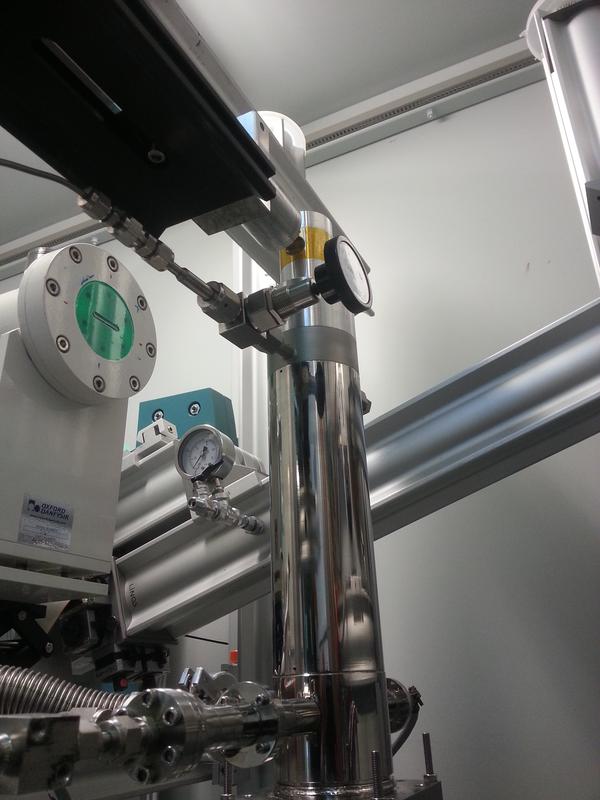Scientists at TU Dresden discover new phenomenon in the field of gas-solid interactions

In situ measurement setup for structural analysis at a synchrotron (Helmholtz Centre Berlin) TU Dresden, Prof. AC1
Adsorption refers to the process by which molecules of a gas collect on the surface of a solid. Metal-organic frameworks are highly porous materials which are widely used for adsorptive applications such as in the reduction of pollutant emissions.
The scientists from Dresden, Berlin and France have now succeeded in demonstrating that these materials can dynamically change their structures.
During this change of structure, the scientists observed a so far unknown phenomenon: instead of absorbing the gas under pressure increase, the materials released the gas eruptively after reaching a certain threshold.
This new phenomenon in the area of gas-solid interactions is therefore called Negative Gas Adsorption (NGA). Normally, materials respond to increased gas pressure by gathering molecules on the outer or inner surface and thus, the gas pressure is buffered and decreases with time. NGA materials can react towards pressure increase by releasing molecules.
Hence, the pressure is further amplified. This counterintuitive phenomenon is triggered by solid state phase transitions.
Similar to a volcano effect, a small trigger can cause a gas eruption out of this material. Gas pressure amplifying materials represent a new class of solids with potential applications in rescue systems, microengineering and separation applications.
For the full paper, please go to http://www.nature.com/nature/journal/vaop/ncurrent/full/nature17430.html
Contact details for journalists:
Prof. Dr. Stefan Kaskel
Chairperson
Inorganic Chemistry
Technische Universität Dresden
Bergstr. 66
01069 Dresden
Germany
Tel.: +49 (0) 351 463-34885
Fax: +49 (0) 351 463-37287
E-Mail: Stefan.Kaskel@chemie.tu-dresden.de
Media Contact
More Information:
http://www.tu-dresden.de/All latest news from the category: Life Sciences and Chemistry
Articles and reports from the Life Sciences and chemistry area deal with applied and basic research into modern biology, chemistry and human medicine.
Valuable information can be found on a range of life sciences fields including bacteriology, biochemistry, bionics, bioinformatics, biophysics, biotechnology, genetics, geobotany, human biology, marine biology, microbiology, molecular biology, cellular biology, zoology, bioinorganic chemistry, microchemistry and environmental chemistry.
Newest articles

First-of-its-kind study uses remote sensing to monitor plastic debris in rivers and lakes
Remote sensing creates a cost-effective solution to monitoring plastic pollution. A first-of-its-kind study from researchers at the University of Minnesota Twin Cities shows how remote sensing can help monitor and…

Laser-based artificial neuron mimics nerve cell functions at lightning speed
With a processing speed a billion times faster than nature, chip-based laser neuron could help advance AI tasks such as pattern recognition and sequence prediction. Researchers have developed a laser-based…

Optimising the processing of plastic waste
Just one look in the yellow bin reveals a colourful jumble of different types of plastic. However, the purer and more uniform plastic waste is, the easier it is to…



